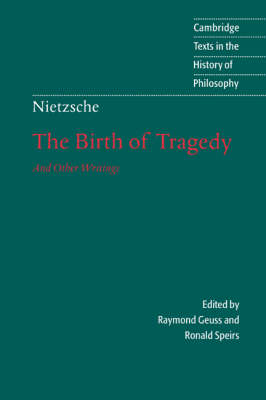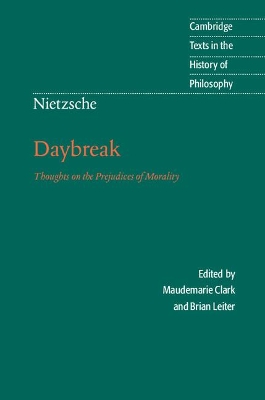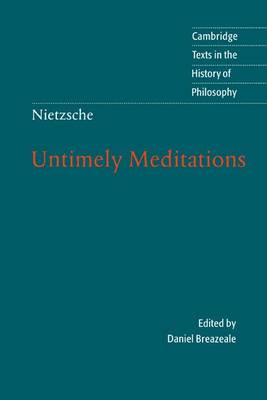Cambridge Texts in the History of Philosophy
6 total works
Beyond Good and Evil is one of the most scathing and powerful critiques of philosophy, religion, science, politics and ethics ever written. In it, Nietzsche presents a set of problems, criticisms and philosophical challenges that continue both to inspire and to trouble contemporary thought. In addition, he offers his most subtle, detailed and sophisticated account of the virtues, ideas, and practices which will characterize philosophy and philosophers of the future. With his relentlessly energetic style and tirelessly probing manner, Nietzsche embodies the type of thought he wants to foster, while defining its historical role and determining its agenda. This edition offers a new and readable translation, by Judith Norman, of one of the most influential texts in the history of philosophy, together with an introduction by Rolf-Peter Horstmann that sets it in its historical and philosophical context.
This remarkable collection of almost 1,400 aphorisms was originally published in three instalments. The first (now Volume I) appeared in 1878, just before Nietzsche abandoned academic life, with a first supplement entitled The Assorted Opinions and Maxims following in 1879, and a second entitled The Wanderer and his Shadow a year later. In 1886 Nietzsche republished them together in a two-volume edition, with new prefaces to each volume. Both volumes are presented here in R. J. Hollingdale's distinguished translation (originally published in the series Cambridge Texts in German Philosophy) with a new introduction by Richard Schacht. In this wide-ranging work Nietzsche first employed his celebrated aphoristic style, so perfectly suited to his iconoclastic, penetrating and multi-faceted thought. Many themes of his later work make their initial appearance here, expressed with unforgettable liveliness and subtlety. Human, All Too Human well deserves its subtitle 'A Book for Free Spirits', and its original dedication to Voltaire, whose project of radical enlightenment here found a new champion.
The Birth of Tragedy is one of the seminal philosophical works of the modern period. Nietzsche's discussion of the nature of culture, of the conditions under which it can flourish and of those under which it will decline, his analysis of the sources of discontent with the modern world, his criticism of rationalism and of traditional morality, his aesthetic theories and his conception of the 'Dionysiac' have had a profound influence on the philosophy, literature, music, and politics of the twentieth century. This edition presents a new translation by Ronald Speirs and an introduction by Raymond Geuss that sets the work in its historical and philosophical context. The volume also includes two essays on related topics that Nietzsche wrote during the same period, and that throw further light on the themes treated in the main text.
Nietzsche wrote The Gay Science, which he later described as 'perhaps my most personal book', when he was at the height of his intellectual powers, and the reader will find in it an extensive and sophisticated treatment of the philosophical themes and views which were most central to Nietzsche's own thought and which have been most influential on later thinkers. These include the death of God, the problem of nihilism, the role of truth, falsity and the will-to-truth in human life, the doctrine of the eternal recurrence, and the question of the proper attitude to adopt toward human suffering and toward human achievement. This volume presents the work in a new translation by Josefine Nauckhoff, with an introduction by Bernard Williams that elucidates the work's main themes and discusses their continuing philosophical importance.
Daybreak marks the arrival of Nietzsche's 'mature' philosophy and is indispensable for an understanding of his critique of morality and 'revaluation of all values'. This volume presents the distinguished translation by R. J. Hollingdale, with a new introduction that argues for a dramatic change in Nietzsche's views from Human, All Too Human to Daybreak, and shows how this change, in turn, presages the main themes of Nietzsche's later and better-known works such as On the Genealogy of Morality. The main themes of Daybreak are located in their intellectual and philosophical contexts: in Nietzsche's training as a classical philologist and his fascination with the Sophists and Thucydides; in the moral philosophies of Kant and Schopenhauer, which are the central foci of Nietzsche's critique of morality; and in the German Materialist movement of the 1850s and after, which shaped Nietzsche's conception of persons. The edition is completed by a chronology, notes and a guide to further reading.
The four short works in Untimely Meditations were published by Nietzsche between 1873 and 1876.They deal with such broad topics as the relationship between popular and genuine culture, strategies for cultural reform, the task of philosophy, the nature of education, and the relationship between art, science and life. They also include Nietzsche's earliest statement of his own understanding of human selfhood as a process of endlessly 'becoming who one is'. As Daniel Breazeale shows in his introduction to this new edition of R. J. Hollingdale's translation of the essays, these four early texts are key documents for understanding the development of Nietzsche's thought and clearly anticipate many of the themes of his later writings. Nietzsche himself always cherished his Untimely Meditations and believed that they provide valuable evidence of his 'becoming and self-overcoming' and constitute a 'public pledge' concerning his own distinctive task as a philosopher.



